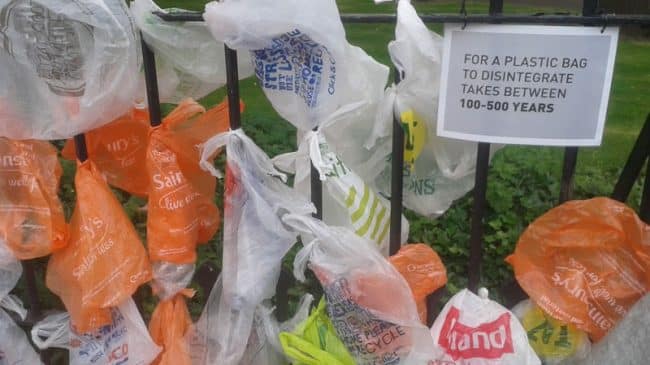Voter Guide: 2016 California Ballot Initiatives
Prop 67 would ban stores from providing disposable plastic bags in which to carry purchases. It permits the sale of recycled paper or reusable bags for a minimum price of 10 cents.
Prop 65 says that if Prop 67 passes, or any other law bans plastic bags, the money from selling other single use bags must go to a fund administered by the Wildlife Conservation Fund.
Fiscal Impact:
Prop 67: relatively small fiscal impact on state and local governments, with a small increase of under a million dollars annually for administrative costs, offset by fees. Reduced litter and waste management costs would provide possible minor savings to local governments.
Prop 65: potential tens of millions of dollars in annual state revenue under certain circumstances. The propositions requires such revenue to support certain environmental programs.
Proponents’ Arguments For:
Proponents of Prop 67 argue that single use plastic shopping bags are a huge litter and environmental problem. Banning plastic shopping bags will keep them out of rivers, lakes, oceans and the landscape, and will save state and local communities tens of millions of dollars in litter clean-up costs. They argue that plastic shopping bags harm wildlife every day and need to be removed from the environment.
Prop 67 continues California’s success in phasing out plastic bags. Existing state law and local laws in many communities have banned single-use plastic bags and have seen a nearly 90% reduction in single use bags, as well as strong support from consumers.
Proponents of Prop 65 argue that right now grocery and other stores get to keep all the money they collect charging for carryout bags instead of that money going to help the environment. Those stores will likely make up to $300 million from the plastic bag ban and charging for their replacements. This is due to a sweetheart deal stores made with the legislature aimed at boosting their profits, not protecting the environment.
Prop 65 requires that the anticipated $300 million revenue from recyclable bag sales goes to protect the environment with projects like drought relief, beach clean-up and litter removal. It puts the California Wildlife Conservation Board in control of these funds for the benefit of Californians, rather than into the profit of stores taking advantage of the plastic bag ban.
Opponents’ Arguments Against:
Opponents of Prop 67 argue that it is a $300 million per year hidden tax increase on California consumers. They will be forced to pay at least 10 cents for every single use bag they get at checkout at stores, and none of that money goes to the state or the environment. Instead Prop 67 allows the stores to keep that money in their profits. A plastic bag ban should not be used as an excuse to profit from charging consumers for bags they used to get without charge.
Opponents of Prop 65 argue that it is just designed to confuse voters. They argue that the money from selling non-plastic single use bags is a drop in the bucket and will shrink over time as people make more use of reusable bags. They argue that the priority in this election is to approve the Prop 67 plastic bag ban and ignore the pointless Prop 65.
Discussion:
These initiatives are not as confusing many people think they look at first. Prop 67 bans plastic bags and allows stores to charge for other single use bags and pocket the money. Prop 65 says if we do ban plastic bags and allow stores to charge for other bags, that money has to go to an environmental fund, not be kept by the stores.
The plastic bag ban is the most important part of this pair of initiatives. The reality is that plastic bags are less than 1% of litter. Banning them won’t have a significant impact on the environment. Banning one tiny part of all litter won’t reduce litter, so litter clean-up will still have to be paid for. Educating the public, providing accessible garbage bins, and cleaning up will reduce litter.
Moreover, lightweight plastic bags are in general better for the environment than the alternatives. When you look at their whole life cycles—from the extraction of raw materials to final disposal—paper and reusable bags use more energy, water and other resources per bag than do lightweight plastic bags. Moreover, most people reuse the lightweight plastic bags they get at stores, mostly for trash disposal instead of buying new plastic bags with all of those environmental costs of manufacturing more plastics. On average each lightweight plastic bag is used 1.6 times while paper bags are typically used only once.
The kerfuffle over the prices charged by stores for alternative bags is relevant. On one hand creating a legal system for stores to charge for bags is a bit of a scam. But the fact is stores are not required to provide customers with free bags at checkout—ever been to Costco? They can charge for them if they want, but know that will turn customers to stores that don’t charge for bags. Making the charge a requirement of state law is a great way to force consumers to pay for something that competition has kept as part of the overall service provided. Prop 65’s requirement that the money go to an environmental fund at least brings a little honesty to the process. But the bottom line is that banning plastic bags does not make sense nor does forcing consumers to pay stores for bags they are willing to provide without charge.

